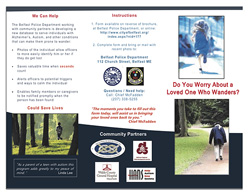| |
|
Wandering Database, Waldo, Maine
Having a database available to identify individuals at risk and provide it to the fingertips of the officers in their cruisers seemed very attractive to Chief McFadden. Just a few nights prior to their conversation in below zero weather, a man in his eighties had been out wandering on a major road at two in the morning, in his pajamas and slippers. Thankfully, the man was willing to get into a Good Samaritan’s car and was brought to the police station. It took several hours before the police could unravel his identity. His family was not even aware that their loved one had gone missing as he had slipped out of the house unnoticed in the middle of the night.
With this new database an officer in their cruiser, who has spotted someone out wandering, will be able to instantly pull up a recent photo and key information of a pre-registered individual including; the name the person uses, what triggers or calms the person, and contact information for parents, caregivers and/ or caseworkers. Family can be contacted immediately and the individual will be spared the trauma of having to go to the police station or the hospital emergency department.
In another scenario, if a pre-enrolled person is reported missing, the officer in the cruiser will have instant access to all the information they would need, including a photo, so they could immediately mobilize search efforts much more effectively. Seconds count in these situations and often minutes, if not hours, are lost while officers attempt to obtain needed information and photos of the person.
For loved ones and caregivers this program provides an added layer of security and peace of mind. Few things are more terrifying to parents of children with conditions like autism, or those caring for their parents with Alzheimer’s, than the thought of their loved one getting lost, and knowing that they will not be able to find their way back home, or to safety.
Chief McFadden and Lee worked closely together in the creation of the Belfast program, Lee serving many roles including primarily as the community “tie-in” person. They are willing to help other police departments to set up similar programs in their areas, including sharing the process and materials that they created for this new program. Parents or family members can be of great assistance to the police in getting a similar program off the ground.
The City of Belfast was able to get this program up and running without any added expenditure of public funds, by utilizing existing computer systems and staff, and by collaborating with other local agencies. Working as partners with this program to identify individuals at risk are many agencies including; Waldo County General Hospital, Belfast Public Health Nurse, RSU 20, RSU 20 Special Education Department, Mid-Regional Child Development Services, TRIAD, Broadreach Family and Community services, Group Home Foundation, and Harbor Hill Center.
The program has since expanded county wide through the Sheriff’s office and into the town of Searsport. The program is a voluntary sign-up and is provided at no cost to individuals; all information is kept confidential.
If you have a person in your life who you are concerned would wander or bolt due to cognitive issues, even those as young as two, or who would be unable to communicate that they were lost, you can enroll them by filling out a simple form and providing a recent photo. School photos are perfect.
Forms available online: http://www.cityofbelfast.org/index.aspx?nid=177
Forms also available for pick-up and drop off with photo at:
Belfast Police Department, Chief McFadden,
Searsport Police Department: Chief LaHaye,
Waldo County Sheriff’s Department: Deputy Sheriff Trafton.
If you do not have a recent photo Chief McFadden in Belfast, or Deputy Sheriff Trafton in Waldo County, or Chief LaHaye in Searsport, will come to your home and take a photo.
If you have any questions please call:
Chief McFadden: Belfast (207) 338-5255, Deputy Chief Trafton: Waldo County (207) 338-6786 or Chief LaHaye: Searsport (207) 548-2304
Linda Lee can be contacted through HANS: www.helpautismnow.com or (207) 505-0307 |
|
|
Republican Journal: Mother's love, legwork launches program to help those who wander |
Program kick-off party set for April 4
By Tanya Mitchell | Mar 20, 2014 |
|
Belfast, Maine -
After moving to Belfast from out of state about 18 months ago, Linda Lee did all she could to make her new home town as safe as possible for her 15-year-old son, Christian "Tiger" Lee.
The task was a bit more pressing for Lee, as she is one of many parents in America raising a child who has autism.
Lee is not alone. According to statistics posted at the Autism Society website, up to 1.5 million Americans live with some form of autism, and an estimated 1 percent of children in the U.S. between the ages of 3 and 17 years old have been diagnosed with an autism spectrum disorder.
Being new to the city, Lee said she wanted to make her son — who is known to family and friends as "Tiger," a nickname he's had since birth — feel more at home. Knowing Tiger is like many people with autism, in that he has a tendency to run away from situations that leave him feeling intimidated, scared or upset, Lee knew where she and her son needed to go first. "The first thing I did was come to the police station with his picture," said Lee, speaking to The Republican Journal Wednesday morning, March 12th.
Lee spoke with Belfast Police Chief Mike McFadden, and told him all about her boy. She told the chief important information, like their home address and phone number, and also explained the types of things that might act as an emotional trigger for her son, such as the fact that he requires all who encounter him to call him Tiger instead of his given name.
Lee also explained some of the topics that she has used in the past to keep Tiger calm. Those calming factors, Lee said, differ from person to person, and in Tiger's case, it's discussing his love of art and drawing — Tiger can draw likenesses of just about any cartoon character one can think of in a fairly short amount of time, and Lee said he does it all from memory.
Movies and music, on the other hand, are topics that may frustrate Tiger because Lee said he doesn't care for either of those things. This is something Lee said she has had to be mindful of for all of Tiger's life. As a toddler, Lee said, it was not uncommon for her to get phone calls from neighbors telling her they had found her son wandering the nearby streets. "He'd run off and then he'd be off opening somebody else's mailbox, with nothing on but a diaper," she recalled.
While Lee said Tiger has been doing much better in recent years, she knew she had to establish a personal connection between her son and the Belfast officers so he would be more trusting of them should they ever need to go looking for him in the future."He was terrified of police," said Lee. And if in fact Tiger did happen to wander away from home and a police officer was able to engage the boy in conversation, Lee said it is unlikely Tiger could tell the officer his mother's phone number or address. The lights and loud sirens could also be cause for Tiger to run away and hide, Lee said, which is why McFadden took the introduction to the police department a step further for Tiger's benefit."The chief showed him around, and showed him the car and let him hear the siren," she said.
That seemed like an adequate solution, until Lee read an article in the New York Times that represented all of her worst fears as a mother. The story detailed the unsuccessful search for 14-year-old Avonte Oquendo, an autistic boy who went missing from his New York City school and was recently found dead.
Moments are a matter of life and death
What struck Lee most about that story was how much time passed before anyone knew the child had left school."It was about 15 minutes before the teacher caught him missing," said Lee. "And then it was another hour before they could mobilize the search [effort]."
Despite all search efforts, which included bloodhounds, uniformed police officers and members of the community, it took 104 days before parts of Oquendo's body were found alongside the banks of a nearby river.
The boy's death inspired U.S. Sen. Charles Schumer, D-N.Y., to introduce legislation allocating $10 million to the U.S. Justice Department for a grant program that would provide tracking devices to families wishing to monitor their loved ones with autism, according to the article. The devices could also help families caring for relatives with other conditions that may cause people to wander, like Alzheimer’s disease. According to the Alzheimer's Association, more than five million Americans live with this condition.
Initially, Lee was excited to know the issue was getting national attention, but when she explored the idea of obtaining tracking devices for Maine families, she learned the technological infrastructure needed for those specific devices does not exist here. The tracking devices that are available require a person to press a button or use a cell phone, both of which Lee said are useless to a person who cannot always recognize they are lost or in danger.
And, Lee said, the funding is limited. "The article makes it sound like there's a pot of gold available," she said. At a loss, Lee went back to McFadden in an effort to get something off the ground for rural Maine families. McFadden said Lee's visit could not have come at a better time, as within that same week, police had responded to the report of an older man walking alongside Route 3, wearing nothing but his pajamas, at about 3 a.m."Luckily a man who was driving by saw him and figured out something was wrong," said McFadden.
The good Samaritan stopped and gave the man a ride to the police department, McFadden said."He could tell us who he was, but not much else," said McFadden, who added officers were able to learn the man's address and get him home safely.
As Lee outlined her concerns regarding the tracking devices, McFadden said, the idea of creating a database that includes names, addresses, contact information for caregivers, current photographs, known triggers and calming topics for those who have conditions that heighten the likelihood that they may at some point wander."The idea sort of floated up from our conversation," said McFadden.
From concept to reality
After that visit with McFadden, Lee ran with the idea. Before McFadden knew it, less than two weeks had passed, and Lee had already touched base with the Belfast public health nurse, Waldo County General Hospital, the special education program director at Regional School Unit 20 as well as staff at local nursing homes and Child Development Services. The hospital agreed to print off a stack of brochures that contain the form seeking information needed to include a person in the database, which will be available at places like the hospital, the Belfast Police Department and eventually, at the department's website. The school's special education department, as well as staff at CDS, agreed to tell families about the database and help them fill out the forms if they wished to include a loved on in the database.
"I had hoped that after that conversation Linda [Lee] would do the legwork," said McFadden. "I never imagined we would be able to put this thing together in less than two weeks."
From there, McFadden said, more aspects of the idea kept falling into place. Within a couple of days, McFadden called the Waldo County Regional Communications Center to see if the existing system could handle such a database. It was then that WCRCC Supervisor Mike Larrivee not only said it was doable, but said he had a dispatcher who was looking for a project that might keep them busy during the slow times of their overnight shift.
McFadden said the database is not limited to residents of Belfast, and in fact it would serve all Waldo County residence and the database would be accessible to all local law enforcement."If an officer happens to see someone wandering and the person is non-verbal, the officer can then use the database to find out who this person is," said McFadden. "It can save moments, and moments really do count."
The information kept in the database is not public, McFadden said, and will be used solely as a way for law enforcement to find the information they need quickly.
And one day, when Maine does have the infrastructure needed to support the tracking devices, McFadden said the database will still serve as a helpful tool to officers.
"I kind of see it as a safety net for our most vulnerable population," said Lee.
Anyone interested in learning more about the database, obtaining a form or finding help with signing up a loved one can call the police department at 338-2420. Lee and McFadden will also kick off the program at a launch party set for Friday night, April 4, beginning at 5 p.m. at the Belfast Police Department, during which sign-up forms and general information will be available.
|
|
|




